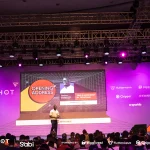Artificial intelligence (AI) is shaping industries across the globe, and Africa is poised to harness its transformative power.
In an interview we conducted with Yemi Keri, founder and CEO of Heckerbella, she shed light on the opportunities AI presents for the continent, particularly in countries like Nigeria, while addressing the challenges and the role of governments in navigating this new technological era.
AI: A Developmental Equalizer
Ms Keri referred to AI as a “developmental equalizer.” In a continent where economic disparity and infrastructure gaps persist, AI has the potential to accelerate progress across sectors, irrespective of a country’s developmental status.
“AI can help resolve issues that have long plagued the continent, from agriculture to healthcare and beyond,” Ms Keri explained. For many African nations, AI represents a leap forward in tackling localized problems with innovative solutions.
Government’s Role in AI Development
As AI continues to shape the future, governments across Africa are tasked with creating the frameworks necessary for its growth. Nigeria has already taken steps in this direction, holding a national AI strategy conference to craft guidelines focused on ethical AI use, data governance, cybersecurity, and privacy.

According to Ms Keri, such frameworks are essential not only for guiding AI development but also for creating environments where AI technologies can flourish.
However, policy isn’t the only area where governments must step in. As AI grows in importance, so too must efforts to close the skills gap. She stressed the need for early education in AI and robotics, recommending that AI-related curricula be introduced at the primary school level. “We must prepare ourselves for the unknown,” Ms Keri noted, emphasizing the importance of skilling and scaling the workforce to meet future challenges.
“We do not know how AI is going to accelerate and change, but we must be prepared for it,”
Yemi Kuri
Infrastructure Gaps: A Barrier to AI Growth
Despite the optimism, Africa’s AI future faces significant infrastructure challenges. One of the major hurdles is the lack of adequate data centers and reliable broadband. Without these, it is difficult to support the computational power needed for AI applications.
“We don’t have enough data centers, and the broadband penetration is low, which slows down innovation,” Ms Keri highlighted. “Bridging this gap will be critical to the continent’s ability to leverage AI fully.“
Energy also plays a crucial role in AI development, and Africa has a long-standing issue with electricity supply. Many areas still struggle with inconsistent power, making it difficult for startups and businesses to deploy AI solutions at scale.
Ms Kuri pointed out that African governments must invest in energy infrastructure alongside data infrastructure to ensure that AI innovation isn’t stifled by basic utility issues.
Early Adopters: Startups Leading the Way
Despite these challenges, African startups are already making strides in AI, particularly in sectors like agriculture and fintech. Entrepreneurs are using AI to provide innovative solutions to problems like soil quality management, pest control, and access to credit. In agriculture, for example, AI-powered drones are helping farmers monitor soil moisture levels, diagnose plant diseases, and optimize the use of fertilizers.
Financial technology (fintech) is another area where AI is making significant inroads. Startups are utilizing AI algorithms to assess creditworthiness, provide financial inclusion, and offer loans based on disposable income. The fintech sector is fast becoming one of the continent’s leading adopters of AI, using the technology to bridge gaps in traditional banking systems.
While infrastructure might be lacking, African innovators are pushing forward, creating AI-powered solutions in spite of the odds. Ms Keri praised this entrepreneurial spirit, noting that when infrastructure improves, it will only accelerate the growth and impact of AI in Africa.
Looking Ahead: AI’s Future in Africa
In the next few years, AI is expected to play a pivotal role in Africa’s development. However, predicting the full impact of this technology is difficult, as AI continues to evolve rapidly.
“We do not know how AI is going to accelerate and change, but we must be prepared for it,” Yemi Keri stated.
There is a growing belief that Africa could become a global hub for AI talent if the right investments are made in education and skills development. With its youthful population, Africa has a unique opportunity to train the next generation of AI specialists. If governments, businesses, and educational institutions work together, Africa could emerge as a leader in AI innovation.
Ethical Concerns: AI and the Creative Sector
One of the more contentious topics discussed was the ethical implications of AI, particularly in the creative sector. As AI becomes more adept at creating content—whether through text generation or visual art—concerns have arisen about how to protect intellectual property and ensure creators are compensated fairly.
Creatives across the continent are grappling with how to safeguard their work in the face of AI tools that can generate similar outputs using publicly available data. This is an area where more regulation and clearer guidelines are needed to protect artists and content creators.
Conclusion: A Bright, Yet Uncertain Future
Africa stands on the cusp of an AI revolution. With the right infrastructure, policies, and talent development, AI could be a powerful tool for addressing the continent’s most pressing challenges. However, without significant investment in these areas, Africa risks being left behind as the world continues to advance technologically.
For African startups and entrepreneurs, the message was clear: keep innovating. The continent’s unique challenges provide fertile ground for AI-driven solutions, and those who can navigate the obstacles will be well-positioned to succeed in the AI era.
Yemi stated a parting thought: “AI is a developmental equalizer. If we can harness its potential, Africa can leapfrog into a new era of growth and prosperity.”
Catch up on news and other tidbits on our WhatsApp Community Page, Twitter/X, and subscribe to our weekly newsletter to ensure you don’t miss out on any news.










